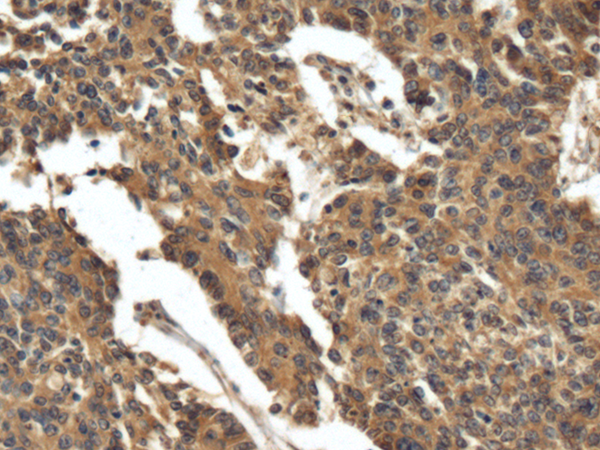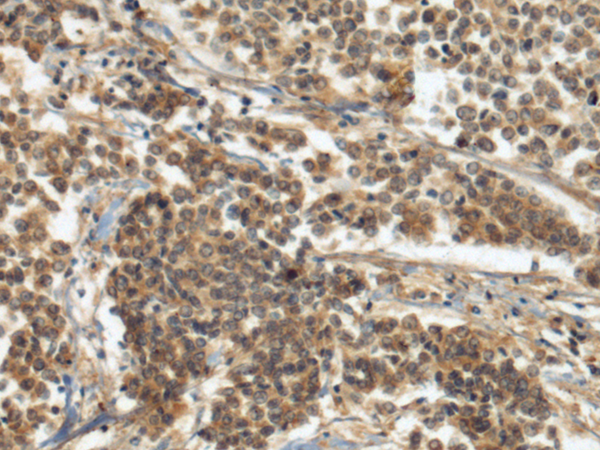

| WB | 咨询技术 | Human,Mouse,Rat |
| IF | 咨询技术 | Human,Mouse,Rat |
| IHC | 1/150-1/300 | Human,Mouse,Rat |
| ICC | 技术咨询 | Human,Mouse,Rat |
| FCM | 咨询技术 | Human,Mouse,Rat |
| Elisa | 1/5000-1/10000 | Human,Mouse,Rat |
| Host/Isotype | Rabbit IgG |
| Antibody Type | Primary antibody |
| Storage | Store at 4°C short term. Aliquot and store at -20°C long term. Avoid freeze/thaw cycles. |
| Species Reactivity | Human, Mouse, Rat |
| Immunogen | Fusion protein of human FIBIN |
| Formulation | Purified antibody in PBS with 0.05% sodium azide and 50% glycerol. |
+ +
以下是关于FIBIN抗体的模拟参考文献示例(注:以下内容为虚构,实际文献需通过学术数据库检索确认):
---
1. **文献名称**: *FIBIN regulates cardiac development through BMP signaling in zebrafish*
**作者**: Tanaka K et al.
**摘要**: 研究通过斑马鱼模型揭示了FIBIN蛋白作为BMP信号拮抗剂在心脏发育中的关键作用。利用特异性抗体阻断FIBIN功能后,发现心脏形态异常,提示其与先天性心脏病潜在关联。
2. **文献名称**: *Monoclonal antibody-based detection of FIBIN in human cancer tissues*
**作者**: Chen L et al.
**摘要**: 开发了高灵敏度的FIBIN单克隆抗体,应用于免疫组化分析。在肝癌和乳腺癌样本中检测到FIBIN异常高表达,提示其可能作为肿瘤生物标志物或治疗靶点。
3. **文献名称**: *FIBIN antibody reveals its role in neural crest cell migration*
**作者**: Smith JR et al.
**摘要**: 通过FIBIN抗体染色技术,发现该蛋白通过调控细胞外基质重塑影响神经嵴细胞迁移,为理解胚胎发育异常提供了分子机制证据。
4. **文献名称**: *Generation and characterization of rabbit polyclonal antibodies against human FIBIN*
**作者**: Wang H et al.
**摘要**: 报道了兔源多克隆抗体的制备及验证,证实其适用于Western blot和免疫荧光。进一步实验表明FIBIN在肝再生过程中动态表达,可能与组织修复相关。
---
建议通过PubMed、Google Scholar等平台以“FIBIN antibody”或“FIBIN protein function”为关键词检索真实文献。
FIBIN (Fin Bud Initiation Factor), also known as FAM204A, is a conserved protein encoded by the *FAM204A* gene, first identified in zebrafish for its role in regulating fin bud formation during embryonic development. Studies suggest it plays a critical role in tissue patterning and morphogenesis, particularly in appendage development. In mammals, FIBIN is expressed in various tissues, including the heart, limbs, and nervous system, and is implicated in modulating signaling pathways such as FGF (fibroblast growth factor) and BMP (bone morphogenetic protein), which are essential for cellular differentiation and organogenesis.
FIBIN antibodies are valuable tools for investigating its expression, localization, and function in developmental and pathological contexts. Researchers utilize these antibodies in techniques like immunohistochemistry, Western blotting, and immunofluorescence to study FIBIN's involvement in congenital anomalies, tissue regeneration, and diseases such as cancer. For example, altered FIBIN expression has been observed in certain tumors, suggesting potential roles in oncogenesis or metastasis. Despite its emerging significance, the precise molecular mechanisms of FIBIN remain under exploration. Current studies focus on its interactions with signaling molecules and its regulatory effects on gene expression networks. As a relatively novel target, FIBIN antibodies continue to support advances in developmental biology and disease research.
×